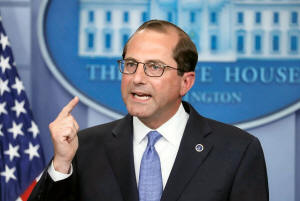|
U.S. to consider expanding Medicare drug
price negotiation
 Send a link to a friend
Send a link to a friend
[May 15, 2018]
By Yasmeen Abutaleb and Michael Erman
WASHINGTON/NEW YORK (Reuters) - The Trump
administration is considering expanding Medicare's ability to negotiate
the cost of drugs by giving private payers a role in setting the price
of medicines administered in hospitals and doctors' offices, Health and
Human Services Secretary Alex Azar said on Monday.
Azar's comments provided more details on the plan to lower prescription
drug costs for Americans announced on Friday by President Donald Trump.
While Trump assailed "middlemen," an apparent reference to health
insurers and pharmacy benefit managers (PBMs), for pocketing negotiated
rebates on drugs rather than passing savings to consumers, the proposal
discussed on Monday appears to see them as part of the solution to high
prices.
Shares of leading PBMs and insurers rose on Monday. CVS Health Corp
<CVS.N> shares climbed 3.7 percent with Express Scripts Holding <EXRX.O>
up 1.2 percent, while Humana Inc <HUM.N> shares rose 1.7 percent and
Cigna Corp <CI.N> closed up 2.2 percent.
"On the one hand we are talking about banning rebates, but on the other
we are talking about how great the private market is at controlling
costs," said Craig Garthwaite, director of the healthcare program at
Northwestern University's Kellogg School of Management. "Where exactly
do we think those price reductions come from?"
Trump has vowed to tackle rising drug prices since running for office,
but his plan spared the pharmaceutical industry from direct government
negotiations to control costs, a proposal he endorsed during the 2016
presidential campaign. Shares of drugmakers rose for a second day on
Monday as Wall Street analysts said the new policies were unlikely to
hurt industry profits.
Medicare is the national health insurance plan run by the federal
government for Americans over the age of 65 and the disabled.
Azar, a former pharmaceutical company executive, said Trump views
tougher negotiation as key to the plan. Azar said his agency will
consider an alternative system for buying Medicare Part B drugs, which
are administered by a healthcare provider and covered directly by the
government, such as many cancer treatments and infused biotech drugs.
The administration would seek to allow private payers to negotiate the
price of those medicines, as health insurers and PBMs already do in
Medicare Part D, which covers drugs patients get at the pharmacy.
[to top of second column]
|

U.S. Health and Human Services Secretary Alex Azar speaks during the
daily briefing at the White House in Washington, U.S., May 11, 2018.
REUTERS/Leah Millis

"We believe there are more private sector entities equipped to
negotiate these better deals in Part B, and we want to let them do
it," Azar said. "More broadly, the President has called for me to
merge Medicare Part B drug payments into Part D, where negotiation
has been so successful."
Health and Human Services senior officials said at a briefing with
reporters on Monday that they could experiment with moving some
drugs from Medicare Part B to Part D in a pilot program, but did not
say when that might begin.
HHS likely has authority to pilot or experiment with limited
programs, health policy experts said. But Joe Antos, of the
conservative American Enterprise Institute, said the bulk of
expensive drugs will likely remain in Part B, limiting the
proposal's ability to significantly lower drug prices.
"These are sophisticated drugs for complicated diseases," Antos
said. "It's a relatively small part of the Medicare population, but
it's a big chunk of spending."
Under the current system, drugmakers and physicians are incentivized
to keep prices high in Medicare Part B, Leerink analyst Ana Gupte
said.
She said companies best positioned to participate in the new
proposal would be insurers that have their own PBMs, Part D plans
and Medicare Advantage business, such as UnitedHealth Group <UNH.N>,
Humana, Anthem Inc <ANTM.N> and Cigna if the Trump administration
approves its merger with Express Scripts.
(Reporting by Yasmeen Abutaleb in Washington and Michael Erman in
New York; Editing by Michele Gershberg, Dan Grebler and Bill
Berkrot)
[© 2018 Thomson Reuters. All rights
reserved.]
Copyright 2018 Reuters. All rights reserved. This material may not be published,
broadcast, rewritten or redistributed.
Thompson Reuters is solely responsible for this content. |